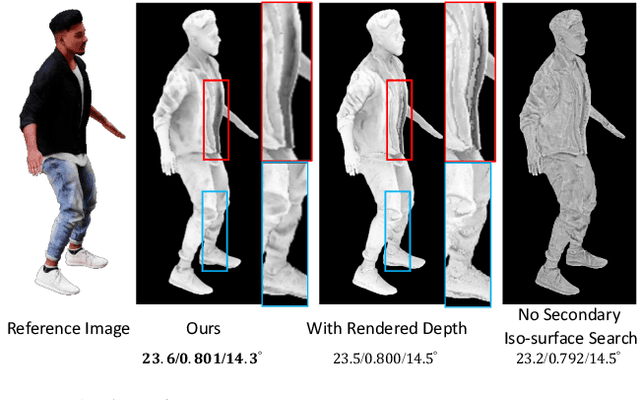Božidar Antić
IntrinsicAvatar: Physically Based Inverse Rendering of Dynamic Humans from Monocular Videos via Explicit Ray Tracing
Dec 08, 2023



Abstract:We present IntrinsicAvatar, a novel approach to recovering the intrinsic properties of clothed human avatars including geometry, albedo, material, and environment lighting from only monocular videos. Recent advancements in human-based neural rendering have enabled high-quality geometry and appearance reconstruction of clothed humans from just monocular videos. However, these methods bake intrinsic properties such as albedo, material, and environment lighting into a single entangled neural representation. On the other hand, only a handful of works tackle the problem of estimating geometry and disentangled appearance properties of clothed humans from monocular videos. They usually achieve limited quality and disentanglement due to approximations of secondary shading effects via learned MLPs. In this work, we propose to model secondary shading effects explicitly via Monte-Carlo ray tracing. We model the rendering process of clothed humans as a volumetric scattering process, and combine ray tracing with body articulation. Our approach can recover high-quality geometry, albedo, material, and lighting properties of clothed humans from a single monocular video, without requiring supervised pre-training using ground truth materials. Furthermore, since we explicitly model the volumetric scattering process and ray tracing, our model naturally generalizes to novel poses, enabling animation of the reconstructed avatar in novel lighting conditions.
Towards Scalable Multi-View Reconstruction of Geometry and Materials
Jun 06, 2023Abstract:In this paper, we propose a novel method for joint recovery of camera pose, object geometry and spatially-varying Bidirectional Reflectance Distribution Function (svBRDF) of 3D scenes that exceed object-scale and hence cannot be captured with stationary light stages. The input are high-resolution RGB-D images captured by a mobile, hand-held capture system with point lights for active illumination. Compared to previous works that jointly estimate geometry and materials from a hand-held scanner, we formulate this problem using a single objective function that can be minimized using off-the-shelf gradient-based solvers. To facilitate scalability to large numbers of observation views and optimization variables, we introduce a distributed optimization algorithm that reconstructs 2.5D keyframe-based representations of the scene. A novel multi-view consistency regularizer effectively synchronizes neighboring keyframes such that the local optimization results allow for seamless integration into a globally consistent 3D model. We provide a study on the importance of each component in our formulation and show that our method compares favorably to baselines. We further demonstrate that our method accurately reconstructs various objects and materials and allows for expansion to spatially larger scenes. We believe that this work represents a significant step towards making geometry and material estimation from hand-held scanners scalable.
 Add to Chrome
Add to Chrome Add to Firefox
Add to Firefox Add to Edge
Add to Edge